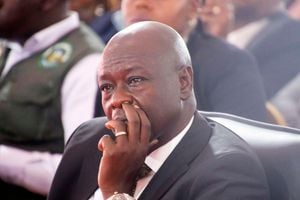African Union leaders to meet on Sudan, more than a year later
Ugandan leader Yoweri Museveni is on Friday expected to lead his counterparts to discuss the situation in Sudan at the African Union Peace and Security Council.
The Council, a 15-member body charged with addressing peace and security on the continent is meeting at a time critics say it has dragged feet in saving lives in Sudan.
It last met on the war-beaten country last year in May, which makes Friday session a sign of hope, or an indictment on the AU’s inability to offer urgent help.
Horrid humanitarian situation
Since Sudan erupted in war in April 2023, there 16,650 people killed in the violence, according to figures from the Armed Conflict Location and Event Data Project (ACLED), a data portal on hotspots.
Sudan has also become the biggest humanitarian crisis in Africa, displacing 10 million people, of which some 1.5 million are in neighbouring countries.
Internally, half of its 50 million people are in need of humanitarian assistance, according to fan assessment from various UN agencies.
At least 5 million of those in need of humanitarian help are actually on the brink of starvation. Overall, Sudan’s humanitarian situation includes 14 million children, the biggest number on the continent.
The Council’s members
Uganda is this month’s chair of the AU Peace and Security Council (AUPSC). But other members include Angola, Botswana, Cameroon, Cote d’Ivoire, Djibouti, Democratic Republic of Congo, Egypt, Equatorial Guinea, Morocco, Namibia, Gambia, Nigeria, Tanzania, and Sierra Leone.
On Friday, they will meet at the highest level of heads of state and government in this 1218th session. Uganda also chaired the session last year in May when the Council called on both sides to a ceasefire.
The warring sides - Sudan Armed Forces and the Rapid Support Forces (RSF) - continued fighting to date. Both sides have since been accused of committing war crimes.
Besides the Council members, AU Chairperson of the AU Commission Moussa Faki Mahamat, Commissioner for Political Affairs, Peace and Security Bangole Adeoye and Mohamed Ibn Chambas, the chair of the AU High-Level Panel on Sudan and High Representative for Silencing the Guns, are expected to attend. UN Secretary General António Guterres or his representative, (UN), Workneh Gebeyehu, Executive Secretary of the Intergovernmental Authority on Development (IGAD), and Ahmed Aboul Gheit, Executive Secretary of the League of Arab States (LAS) are also scheduled to join in the virtual meeting.
AU’s previous efforts to address the conflict
The African Union, after last year’s meeting tried to stop the war by reaching out to the parties. It didn’t succeed.
One problem was that Sudan remains suspended from the AU’s activities, having committed a coup in October 2021, 19 months before the war began.
Now it has been pushing for shuttle diplomacy as well as coordinating with various stakeholders with influence on warring sides.
Amani Africa, a think-tank based in Addis Ababa and which analyses AU decisions, says multiple peace bids have also become a problem in resolving Sudan conflict.
“One of the challenges for the peace process in Sudan is the plethora of initiatives for peace, with overlapping, if not competing, engagements and initiatives,” it said in a bulletin on Thursday. “Apart from spreading thinly diplomatic resources and giving rise to ‘forum shopping,’ the diversity of, and at times competing, initiatives are undermining the effectiveness of regional and international engagements.”
The AU High-Level Panel on Sudan was created just as the US and Saudi Arabia ran the Jeddah Process. Egypt attempted to mediate and IGAD was running its own peace bid. They all stalled.
But IGAD later joined Jeddah Process to represent the AU. Now the Panel has been trying to stop duplication.
In May, the Panel said it was working with Adama Dieng the new AU special envoy for the prevention of genocide to develop a strategy to stop atrocities and protect civilians.
Current calls to stop the rot
These leaders are gathering as calls grow to implement an arms embargo on Darfur and stop the RSF violence in el Fasher. There have also been calls to open humanitarian corridors and up mediation efforts.
As such, the AUPSC is under pressure to make a definitive decision. The Human Rights Watch on Thursday said the African Union should work with the United Nations to deploy a civilian protection mission to address ongoing atrocities across Sudan, especially in Darfur.
“At its next meeting, the Peace and Security Council should spell out what urgent steps it plans to take to ensure the deployment of a United Nations-backed civilian protection mission and to support investigations by the African Commission on Human and Peoples’ Rights,” said Allan Ngari, Africa advocacy director at Human Rights Watch
The watchdogs also say the irregular meetings make it difficult to make urgent decisions .
HRW in particular wanted the UN Security Council to implement resolution 2719, which allows the UN to consider requests from the AU to cover up to 75 percent of an AU-led peace support operation’s annual budget on a case-by-case basis. The resolution not been utilized in any case yet.





